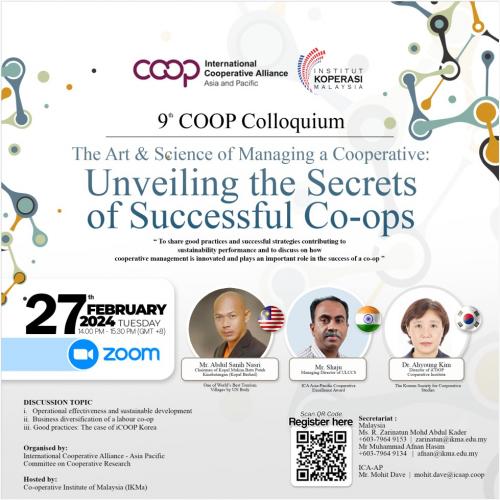- Home
- About us
The Organization
- Resources
- Membership
Regional Committees
Global Sectoral Organizations
- International Co-operative Agricultural Organisation
- International Co-operative Banking Association
- Consumer Co-operatives Worldwide
- International Co-operative Fisheries Organisation
- International Health Co-operative Organization
- International Co-operative Housing Organisation
- International Co-operative and Mutual Insurance Federation
- International Organisation of Industrial, Artisanal and Service Producers Co-operatives
- Library
- About Co-op
You are here

Background
The International Cooperative Alliance Asia and Pacific (ICA-AP) Committee and Cooperative Research (CCR) are delighted to announce a collaborative effort with the esteemed Cooperative Institute of Malaysia (CIM) for our upcoming colloquium in an online webinar. This joint initiative aims to foster an academic dialogue on crucial issues related to cooperative education and research. The 9th COOP Colloquium, organized in collaboration with CIM, seeks to bring together diverse perspectives, share valuable insights, and facilitate an enriching exchange within the cooperative community across the Asia and Pacific region.
Each iteration of the COOP Colloquium focuses on a theme and presents different perspectives. Digital and social media platforms are used to promote the COOP Colloquium and to have a conversation around cooperative education and research. The ninth iteration of the COOP Colloquium will focus on the theme ‘The Art and Science of Managing a Cooperative: Unveiling the Secrets of Successful Coops’.
Managing a Cooperative
Management is both an art and a science. There are principles of management and the structure of management activities can be identified and described. Aspects of management relating to operations and finance can be scientifically analyzed. As an example, the process of budgeting, which is part of the planning process can be broken down into component steps and analyzed. On the other hand, many aspects of management involve working with human resources, communicating within and outside the co-op, analyzing competitor’s actions and setting strategies. Those processes are more complex and involve both an art and a science.
A cooperative manager needs to operate an efficient and effective business organization, respond to their competitive environment, manage human resources, meet customer needs and comply with all applicable rules and regulations. There are some areas where the cooperative managers face different challenges, relative to managers of other types of firms and need different skill sets. Some of these differences are related to the frequency and nature of contact with the owners, the complexity of the cooperative objective function and the avenues by which members receive benefits, and the balancing act between protecting the viability of the cooperative and maximizing returns.
A recent study undertaken by Slade Shantz et all[1] proposes to establish flatter structures that more evenly share roles and responsibilities. That way, governance matches the egalitarian principles behind cooperatives. It also recommends drawing on the informal hierarchies that naturally guide social interactions.
Effectively managing a cooperative business involves implementing key strategies to ensure its success and sustainability. First and foremost, establishing a solid governance structure with clear roles, responsibilities, and transparent decision-making processes is crucial. Actively engaging and involving members in the cooperative's affairs through regular meetings and educational sessions fosters a sense of ownership and commitment. Sound financial management practices, including diversifying income streams and maintaining a sustainable financial model, are essential for the cooperative's long-term stability. Short-term and long-term goals and strategic planning ensure adaptability to changing market conditions and evolving member needs.
Leadership plays a pivotal role, necessitating the recruitment and development of competent leaders who understand cooperative principles. Technology integration can streamline operations, enhance communication, and improve member services. Robust risk management strategies and contingency plans help mitigate unforeseen challenges. Regular market research informs the cooperative about industry trends and member preferences, encouraging innovation in products and services to remain competitive.
Legal compliance and ethical standards should build trust among members and stakeholders. Community and social responsibility initiatives aligning with cooperative values contribute to a positive public image. Education and training programs covering cooperative principles, financial literacy, and leadership skills empower members and staff. Collaborating with other cooperatives, industry associations, and stakeholders through networking events fosters shared experiences and potential partnerships. By implementing these strategies, a cooperative business can establish a strong foundation for sustainable growth, member satisfaction, and positive community impact.
Unveiling the Secrets of Successful Co-ops
This colloquium will share good practices and successful strategies contributing to cooperatives' economic, social, and sustainability performance. It will look at how cooperative management is innovated and plays an important role in the success of a co-op. This colloquium is a starting point to deep-dive into the role of management in cooperatives. It aims to bring together cooperative advocates, practitioners and scholars from across the Asia and Pacific region.

About the Presenters

Mr. ABD. SANIH NASRI Abd Sanih, Chairman of KOPEL Berhad, is a dynamic speaker representing the cooperative. He addressed topics like social entrepreneurship at events such as the 2019 Seminar Program at Cooperative Institute of Malaysia (CIM) and the 2021 Climakers Asia Digital Workshop in Japan. In 2022, he presented at the Desa Lestari Workshop and the 10th Asean +3 Village Leaders Exchange Program. His 2023 participation in The Asian Productivity Organization's Conference on Tourism 4.0 showcased his commitment to cooperative insights and social entrepreneurship discussions, solidifying his role as a dedicated advocate.

Mr. Shaju is the Managing Director of ULCCS. He is also the Director Board member of all the subsidiaries of ULCCS namely UL CyberPark, UL Technology Solutions, and ULCCS Foundation, etc. Mr. Shaju plays a key role in the implementation of strategic decisions taken by ULCCS, managing the financial activities and general administration. Under his leadership, the cooperative society has achieved financial prudence and transformed into the best managed cooperative society in Asia. He has contributed significantly to the revolutionary diversification of ULCCS.

Dr. Ahyoung Kim is the Director of iCOOP Cooperative Institute. She serves as a director of the Korean Society for Cooperative Studies. She is involved in the Korean Association of Human Resource Development. Her recent research mainly concerns innovative cooperative development and the human resource development of social economy and cooperative. She took a Ph.D. in Business Administration at Sungkonghoe University of Rep. of Korea. The title of her doctoral thesis was “Human-Centered HRD and Communities of Practice of Co-operatives: The Case Study of iCOOP Korea."
[1] Slade Shantz, A., Kistruck, G., Pacheco, D., & Webb, J. 2020. How formal and informal hierarchies shape conflict within cooperatives: A field experiment in Ghana. Academy of Management Journal, 63(2): 503-529.
Event start date:
Tuesday, February 27, 2024
Event end date:
Tuesday, February 27, 2024
Venue:



